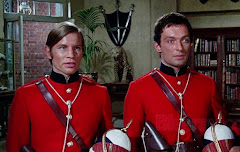 |
| Quid (Stacy Keach) with his harmonica. |
Released when slasher films like Halloween (1978) and Friday the 13th (1980) were in vogue, Roadgames is an oddity. It sounds like a slasher film, but--as its PG rating suggests--it's more of a throwback to suspense films like The Hitch-Hiker (1953).
Thematically, Roadgames mirrors Hitchcock's Rear Window with its exploration of voyeurism and the paranoia that comes with it. Just as James Stewart’s character in Rear Window is confined to his apartment, Keach’s Quid is largely confined to his truck, observing the world through his windshield. The film also echoes Steven Spielberg's Duel (1971) with its intense, road-bound cat-and-mouse game, where the vast, empty landscapes heighten the sense of isolation and danger.
Stacy Keach delivers a standout performance as Quid, a trucker with a penchant for poetry and a sharp wit. His character’s quirky charm and intelligence add depth to the film, making him a compelling protagonist. On the other hand, Jamie Lee Curtis has limited screen time and is mired in an underwritten role as a hitch-hiker (again...she also played one in The Fog).* Aussie actress Marion Edward fares better as a stranded wife picked by Quid--and who fears that he may be the killer.
 |
| Shades of Hitchock's Rear Window. |
Thus, if you watch Roadgames, watch it for the ride. In that context, it delivers modest thrills and a likable quirkiness. The best example of both is a scene in which Quid believes he has the killer trapped in a bathroom stall--and isn't quite sure what to do.
Though it was not a box office success in the U.S., Roadgames attracted enough attention to get Richard Franklin a plum directing assignment. His next movie, Psycho II (1983), was a belated sequel to one of his idol's most famous films.
* Richard Franklin has stated that Actors Equity of Sydney was displeased that an American actress was cast in the role, instead of an Australian performer. Avco Embassy, who provided some of the film's financing, insisted on a "name star" that American audiences would recognize. That led to the casting of Jamie Lee Curtis, who had previously starred in Halloween and The Fog.










